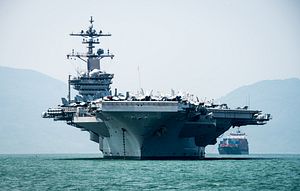Could the United States blockade China’s oil during a time of war? The idea is appealing, as it might enable the United States to force a negotiated settlement to the conflict without having to content with China’s formidable anti-access/area denial (A2/AD) system. But would it work? A new study in the Naval War College Review expresses some skepticism.
China is deeply dependent on foreign oil, and its sea lanes of communication are vulnerable to disruption. This has allowed some analysts to ruminate about how best the United States could exploit this vulnerability during war. Blockades sometimes work, even in great power conflict; the British blockade of Germany in the First World War helped bring the latter to its knees. Although German efforts to establish a submarine blockade of Britain failed in both world wars, they caused no end of trouble to British authorities. In the waning days of World War II, the United States blockaded Japan so successfully that the Japanese economy and military ground to a halt.
Gabriel Collins has evaluated the prospects for a distant oil blockade against China in a new article at the Naval War College Review, and isn’t terribly optimistic. Building on an earlier article, Collins runs through the tactical and operational aspects of a distant blockade against China. Interdicting maritime shipments of oil would be tricky, given that many other countries in the region depend on the same sea lanes as China. The U.S. Navy would need to interdict terminals in the Indian Ocean, as well as the South China Sea. American warships might need to sink or seize neutral-flagged tankers, an action certain to have political consequences.
Mainly, however, Collins concentrates on the strategic and political problems that a blockade would present. Collins lists a number of downsides, including severe disruption to the global economy, and very heavy pressure on the United States to end the war and restore the status quo. Moreover, China could take a variety steps to mitigate the effects, including increasing domestic oil production; replacing oil with substitute fuels; importing more oil from Russia and expanding pipeline capacity; and rationing and diverting from less critical sectors in the civilian economy.
Finally, it’s worth noting that a decision not to tangle with the sharp teeth of China’s A2/AD system would likely leave China in control of whatever asset the war was about, at least for a time. It would leave China’s standing military forces largely intact, apart from what damage slow attrition could inflict. And Collins notes that China is extremely unlikely to endure the situation faced by Japan in the waning days of the Pacific War. During the last year of that conflict, Japan lacked sufficient fuel to operationally deploy its remaining air and naval assets. The largest battleship in the Imperial Japanese Navy, HIJMS Yamato, famously sailed into her last mission without enough fuel to get home. But China produces enough, can substitute enough, and can import enough oil to ensure that its military machine will never go thirsty.
These arguments are also worth thinking about in context of Josh Rovner’s suggestion that a war between the United States and China might go on for some time. Collins’ point is clear: A distant blockade is likely to fail, and we shouldn’t plan around it. Despite the vulnerability of China’s energy supply, the United States can’t rely on a blockade alone to win the war.
































